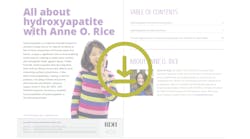I recently returned from my state dental hygienists’ association’s annual session. Our House of Delegates combined continuing education, friendship, and support throughout the weekend. Many of our discussions revolved around our association’s budget and strategic plan. For those of you unfamiliar with strategic planning, it is basically an outline of where an organization would like to go and what strategies will get it there. My state dental hygiene association models its plan after that of the ADHA, so numerous discussions were held about membership. In this article I’ll discuss membership and how we can improve it.
For years we have stressed the importance of membership, but is the message being received? How many of you are members of your professional association? If you aren’t, ask yourself why not. Be honest, because honesty holds the truth. How many speakers have you heard who claim to be authorities on particular subjects, yet are not members of their professional association? If they are to have credibility, they must maintain professional memberships. If the author of an article is not a member of a professional association, what credibility does he or she have? If dental hygiene educators are not members of their associations, what credibility do they have with their students and educational institutions? How can we recruit and retain members when our so-called authorities aren’t members?
From the moment I entered hygiene school, I have been a member of ADHA. I view it as a responsibility of being a dental hygienist. I have worked in offices with other hygienists who, for whatever reasons, choose not to be members. Their excuses include: it’s too expensive; it doesn’t mean anything; and they don’t get anything for their money. While membership promoters say it is your livelihood, Jane Hygienist doesn’t get it. Are you one of those Janes? What can we do to make it happen for you? Attending continuing education meetings and listening to quality speakers promote dental hygiene isn’t enough. What else can the association do to make membership valuable for you? Do you belong to any other associations? Do you volunteer for any cause or ideal? In order for an organization to grow, it must give ownership to its members. How can dental hygiene give ownership to instill the value of membership? In a recent ad campaign for blood donations, a Red Cross representative said that many people don’t give blood because they are not asked. The representative concluded with “Consider yourself asked.” That’s what I’m doing here - consider yourself asked what will make dental hygiene membership important to you.
The national leadership is developing the requirements needed for the advanced dental hygienist practitioner (ADHP). If you don’t know what that is, ask. Attend a continuing education meeting and ask. Call or email an officer and ask. You may not agree with the policies or procedures, but that’s how organizations grow. Only through cooperation and collaboration does anything get accomplished.
I recently read several articles on cooperative and competitive learning. All organizations must strive to work cooperatively and competitively. If you don’t agree, discuss and debate, don’t sit back and be apathetic. Society as a whole has become apathetic to causes and organizations. Have you become apathetic to your profession by not participating?
It’s time for us to think about membership in “out of the box” terms. Begin with dental hygiene students in your area because they are the future of the profession. Incorporate them into your activities, and stress volunteering as part of the life-long learning process of the profession. Promote dental hygiene within your community - public awareness breeds knowledge and knowledge is power, and with power there are no limits to what can be accomplished.
Time and finances are precious to many of us, and we may not be able to give of ourselves as we would like. By no means is this article meant to make anyone feel guilty. Rather, it is meant to open dialogue to everyone and not just “the powers that be.” What do you think?





